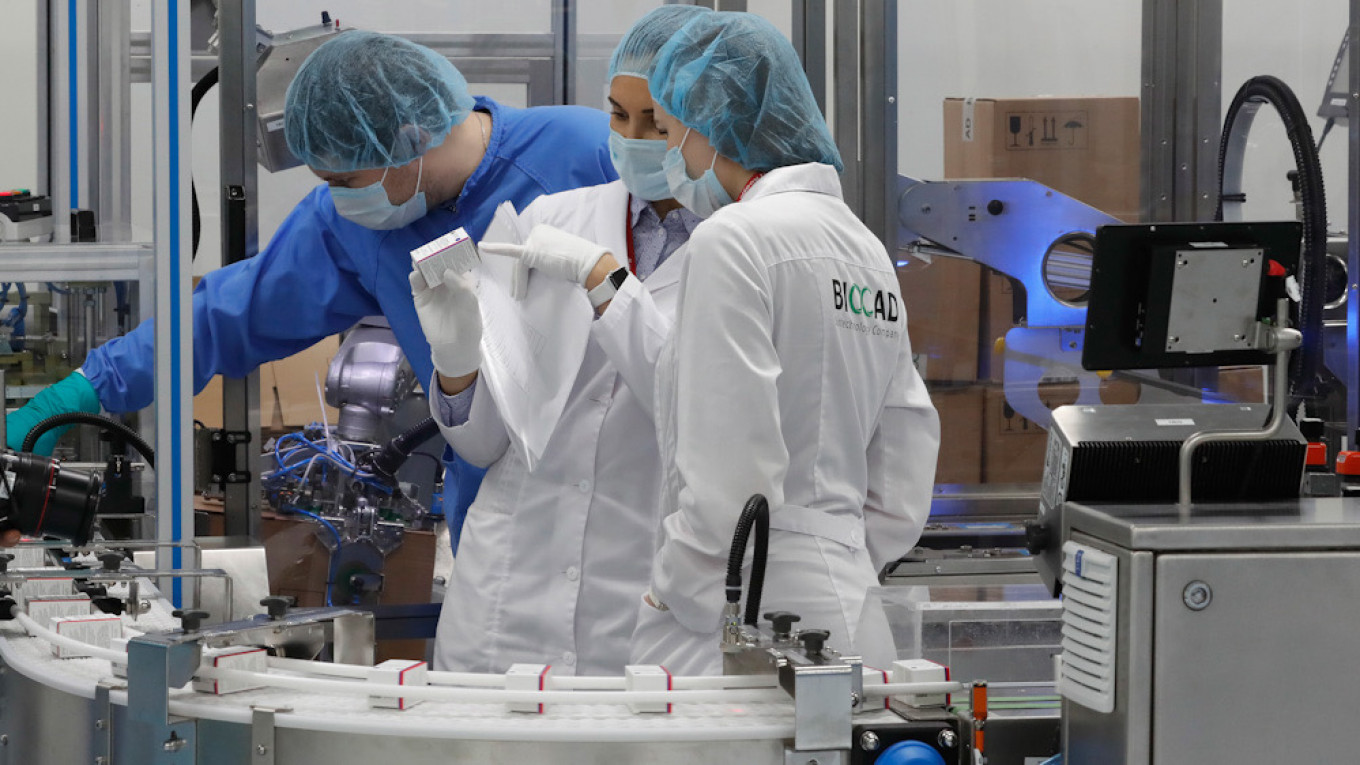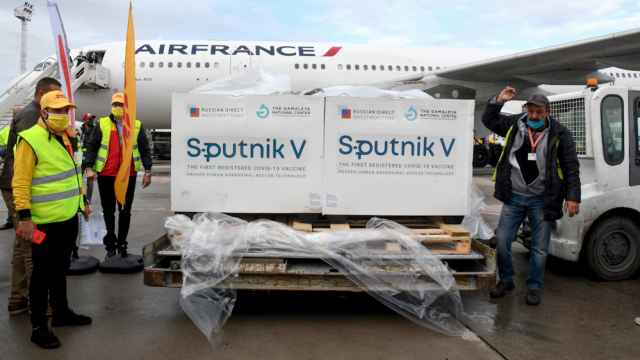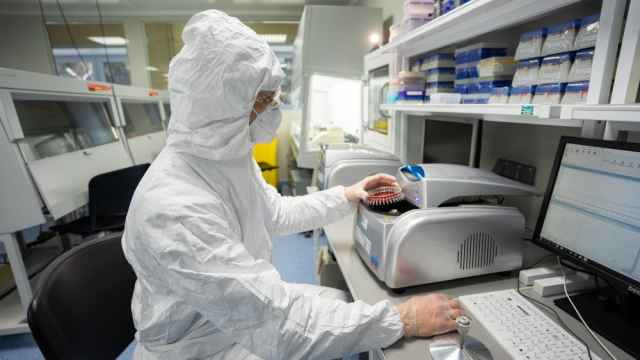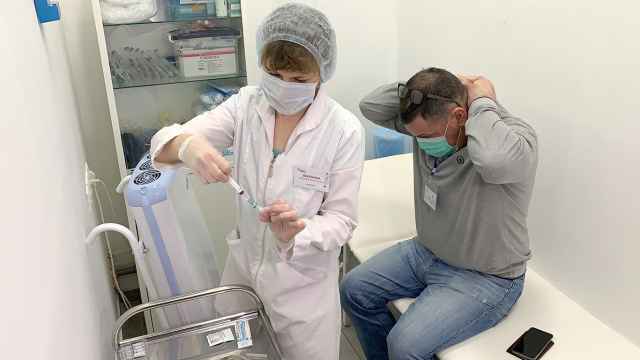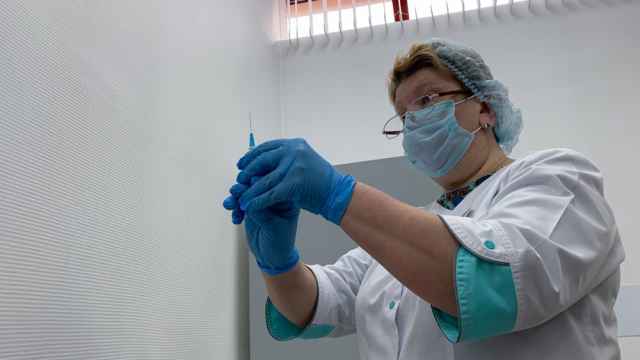A surge in production of Russia’s Sputnik V coronavirus vaccine combined with domestic distrust of the jab could lead to a boom in exports, pharmaceutical executives and industry specialists in the country told The Moscow Times.
After big promises and a shaky start to production ahead of a wide-scale rollout in the fall — which saw production forecasts halved — Russian manufacturers now look set to overshoot output targets, supplying up to 40 million doses a month by June.
“There will absolutely be excess supply in Russia. I believe that around 30% of Russian-made vaccines will be ready for export,” said Vitaly Shakhnazarov, quality director at COREX, a pharmaceutical logistics firm working through Russia and Eastern Europe.
When Russia began preparing for mass Sputnik V vaccination, pharmaceutical plants belonging to six different companies were extensively retooled for production of the first-in-the-world jab.
With expectations high, the ambitious mobilization push did not come off without setbacks.
“Russia overpromised on how much it could deliver in the fall. We weren’t ready to scale up so quickly,” Shakhnazarov said.
“We saw the same thing happen in the West. The pharmaceutical industry doesn’t work well in emergency mode.”
In September, Kirill Dmitriyev, the head of Sputnik V’s financer the Russian Direct Investment Fund (RDIF), predicted production of 10 million doses monthly by December. A month later, Alexander Gintsburg, the head of the Gamaleya Institute responsible for creating the vaccine put the estimate at only five million doses by the end of the year.
By early February, officials said a total of only seven million doses had been approved for use since the start of the production of the vaccine.
Retooling problems saw Russian also underdeliver on vaccine supplies to Hungary — one of Moscow’s key European allies — which received only a third of the 300,000 doses of Sputnik it had been expecting in January.
However, things have changed and industry figures now say the manufacturing infrastructure is now in place to fulfil Russia’s domestic and international vaccine supply commitments.
“The idea that Russia has a production capacity problem is a little out of date,” said Dmitry Kulish, a professor at Skoltech, a private Moscow research institute specializing in pharmaceutical innovation.
“It was true in December, but it isn’t anymore.”
Kulish believes that the RDIF’s estimates of 30 million Sputnik doses manufactured monthly by March — 10 million of them in Russia and the rest in countries including Brazil, South Korea and Kazakhstan — may be conservative, and that by June the Russian pharmaceutical sector could overshoot its ambitions and produce up to 40 million jabs monthly.
A lot of hope, experts say, is being placed in one of Russia’s largest drugmakers, R-Pharm.
Its founder and chairman, Russian billionaire Aleksei Repik, told the Moscow Times the company is planning to produce over 10 million doses per month at three different plants across Russia.
“R.Pharm joining the production of the vaccine is important,” said Ilya Yasny, a senior scientific research at the Russian biotech firm Inbio Ventures, noting that the firm’s infrastructure will provide for much larger scale production than other pharmaceutical companies.
“They will be brewing the vaccine in a 200-liter bioreactor, compared to the 5-liter reactors used by some of the other producers right now.”
R.Pharm is also seeking clinical approval for a combination jab of both Sputnik and the AstraZeneca vaccine. If approved, it is likely to predominantly service the export market, with shipments planned for Saudi Arabia and Turkey.
Even so, industry figures warn of potential bumps on the road ahead that could disrupt production.
“Production could be constrained in future by a shortage of raw materials, as the worldwide vaccine race has led to deficits in certain areas,” said Repik. Despite earlier promises to start in January, R-Pharm is yet to launch production of the vaccine at its factory in Moscow.
Another potential complicating factor could be the appearance of new Russian vaccines, with Novosibirsk’s Vektor Institute having received regulatory approval for its jab, and Moscow’s Chumakov Center expected follow soon, moves which could complicate mass vaccine production.
“The two new Russian vaccines might actually hinder production as they divert the logistical resources needed to produce and transport Sputnik,” said COREX’s Shakhnazarov.
“I am not sure Russia has the capacity to roll out all three vaccines.”
Russian distrust
Whatever the possible production bottlenecks, export supplies are likely to be stoked by Russians’ reluctance to receive Sputnik V.
International and domestic polling consistently indicates that the country’s population remains among the world’s most vaccine-skeptical, with only 30% of Russians saying they believe most of their compatriots would be willing to receive a scientifically proven and widely available Covid-19 vaccine — one of the lowest rates in the world.
Widespread suspicion of the speed at which Sputnik V was approved, alongside a deep-rooted cultural preference for foreign-made medicines among many Russians have led to suppressed demand for the world’s first Covid jab in its homeland.
Though the Russian government hopes to vaccinate sixty percent of the population by the end of 2021, few observers believe this to be a realistic goal. President Vladimir Putin himself has yet to have the vaccine, and there has been no large-scale state-run PR campaign to sell the jab to citizens.
While estimates vary widely, some analysts suggest that as few as twenty to thirty million Russians might ultimately receive Sputnik V, leaving a glut of excess doses for the international market.
“Russia will only be able to vaccinate 70% of the population, perhaps 80% if it is made compulsory,” said Shakhnazarov.
Supply chain
Sputnik V’s international supply chain is a sprawling patchwork of licensing agreements with pharmaceutical suppliers in South Korea, India and Brazil.
While geographical constraints mean that existing vaccine production deals to produce Sputnik in South Korea and Brazil are likely to supply the Asian and Latin American markets — where Russia’s vaccine has proved popular — surplus vaccines at home could be supplied to nearby countries that have few obvious alternatives to Russian-made jabs.
“Given that there are logistical issues that come with the transport of Sputnik doses, it makes sense to sell the domestically produced vaccines to neighbouring countries,” said Shakhnazarov.
Though many of Russia’s immediate Eastern European and Central Asian neighbors qualify for the World Health Organization’s COVAX program, which guarantees vaccines to 92 low- and middle-income countries, the program guarantees supplies or only around 20% of the recipient countries’ populations. That means Sputnik V is likely to remain in demand.
A potential glut of Sputnik V also raises the prospect that the European Union might seek to bolster its own flagging vaccination program with Russian supplies.
While European Commission President Ursula von der Leyen has publicly cast doubt on Sputnik’s prospects in Europe, German chancellor Angela Merkel and other national leaders have expressed interest in the jab, giving Russian analysts cause for optimism about the vaccine’s prospects in Europe.
However, with domestic demand for Sputnik still underwhelming, some fear that low take-up in Russia could be embarrassing amid large-scale international roll-out.
“All of the demand for Sputnik will be met,” said Skoltech’s Kulish.
“The problem is creating enough honest demand to meet the supply.”
A Message from The Moscow Times:
Dear readers,
We are facing unprecedented challenges. Russia's Prosecutor General's Office has designated The Moscow Times as an "undesirable" organization, criminalizing our work and putting our staff at risk of prosecution. This follows our earlier unjust labeling as a "foreign agent."
These actions are direct attempts to silence independent journalism in Russia. The authorities claim our work "discredits the decisions of the Russian leadership." We see things differently: we strive to provide accurate, unbiased reporting on Russia.
We, the journalists of The Moscow Times, refuse to be silenced. But to continue our work, we need your help.
Your support, no matter how small, makes a world of difference. If you can, please support us monthly starting from just $2. It's quick to set up, and every contribution makes a significant impact.
By supporting The Moscow Times, you're defending open, independent journalism in the face of repression. Thank you for standing with us.
Remind me later.




